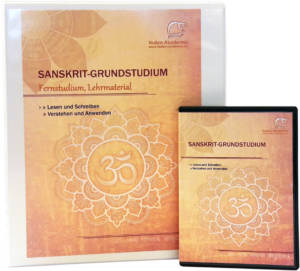Sanskrit - the Language of the Vedas
Sanskrit Distance Learning Course

The Teaching Material for
Sanskrit Distance Learning Course

- 1 workbook (260 pages; 6 lessons with question section)
- Basic Sanskrit Studies (2 DVDs)
Listen to the Sanskrit Prayer
Training Levels
of Sanskrit Distance Learning
Complete training: Sanskrit basic studies (approx. 6 months)
Conclusion: a written final examination
Sanskrit Distance Learning at a Glance
Requirements: No school requirements
Degree: Certificate or final diploma from the Vedic Academy
Course start: Anytime
Registered: at the National Centre for Distance Education (Staatliche Zentralstelle für Fernunterricht – ZFU) under the number II/165 (Sanskrit-Grundstudium)
Your Sanskrit Instructor:
André Preuß
 André was born in Berlin in 1972. During his time at high school he came in contact with Vedic knowledge, and the Sanskrit language, and was immediately fascinated by it. He began to explore the Sanskrit scriptures on his own and started to learn the language. During his biology studies, he used the opportunity to learn Sanskrit in a structured way at the Humboldt University in Berlin. Thus he found his passion – Sanskrit poetry, with its verses and wordplay, which still continues to fulfil him today. Previously he taught Sanskrit in private lessons. He lives and works in Berlin, but really feels at home in Tirunarayanapuram in southern India with its Sanskrit Academy and School, and in Hyderabad, where he continues to deepen his Sanskrit knowledge at the Jeeyar Educational Trust.
André was born in Berlin in 1972. During his time at high school he came in contact with Vedic knowledge, and the Sanskrit language, and was immediately fascinated by it. He began to explore the Sanskrit scriptures on his own and started to learn the language. During his biology studies, he used the opportunity to learn Sanskrit in a structured way at the Humboldt University in Berlin. Thus he found his passion – Sanskrit poetry, with its verses and wordplay, which still continues to fulfil him today. Previously he taught Sanskrit in private lessons. He lives and works in Berlin, but really feels at home in Tirunarayanapuram in southern India with its Sanskrit Academy and School, and in Hyderabad, where he continues to deepen his Sanskrit knowledge at the Jeeyar Educational Trust.
Sanskrit Training: Educational Goals and Contents
Sanskrit – the language of the Vedas
Although thousands of years old, Sanskrit still retains its relevance and liveliness. The gateway to all traditional Indian arts and sciences was, and still is, the study of fundamental Sanskrit writings. Distance learning in Sanskrit allows you to widely open this door. For example, if you want to get deeper into Vasati, astrology, Ayurveda, yoga or Vedic spirituality, a basic knowledge of Sanskrit is a welcome foundation.
The word “Sanskrit” means “refined” or “decorated”. The name is to be understood in such a way that Sanskrit is a refined form of language that does not primarily describe the material realities but provides insight into the secrets of the Vedic spiritual world.
According to the Vedas, sound is the origin of the creation of this universe. The original sound in the form of a single syllable, whose simplicity carries the power of all creation. This syllable is called Pranava, the life force of the universe and consists of the three letters a, u and m.
Sound and meaning are much more closely connected in Sanskrit than in other languages, so that each word – even without understanding it – has a direct effect on the consciousness of the listener. This unity of meaning and sound is called Shabda in Sanskrit.
Structure of the course
First we learn the Sanskrit script, Devanagari. In addition, you will receive numerous exercises and text examples. You will then work with popular Sanskrit verses and their word-for-word translation. This will help you to consolidate your understanding of grammar and develop your first small vocabulary. You will learn the correct pronunciation and compliance with the various verse meters.
The basic Sanskrit course consists of six lessons, each of which requires 30 hours of study and practice. With a daily rate of one hour, each lesson can be completed in one month.
Lesson 1: Writing and sound elements
- Basic and ligature characters of the Devanagari font
- The sound apparatus
Lesson 2: Pronunciation and Sandhi
- Sound and rhythm rules
- Special characters and digits
- The merging of consecutive words (Sandhi)
Lesson 3: Declination
- The main declination forms
- Nouns and adjectives
- Case and Numbers
Lesson 4: Forming Sentences; The Verb
- Formation of simple sentences
- Important structural words
- Principle of the verb root
- The elementary verb forms
Lesson 5: Pronouns and Sentence Elements
- The different pronouns
- Interrogatives
- Amounts
Lesson 6: Composites; Practical Applications
- Samsas (compound word constructions)
- Important terms from the Vedic world
- Reciting Mantras and Slokas
Information Material for Download
Texte zum Thema
- Die heilsame Wirkung spirituellen Klangs
- Das Vedanta Sutra von Mahamuni Vyasadeva
- Wodurch zeichnet sich die vedische Kultur aus?

 My Life in the Information Field
My Life in the Information Field Our Agenda Towards Enlightenment
Our Agenda Towards Enlightenment